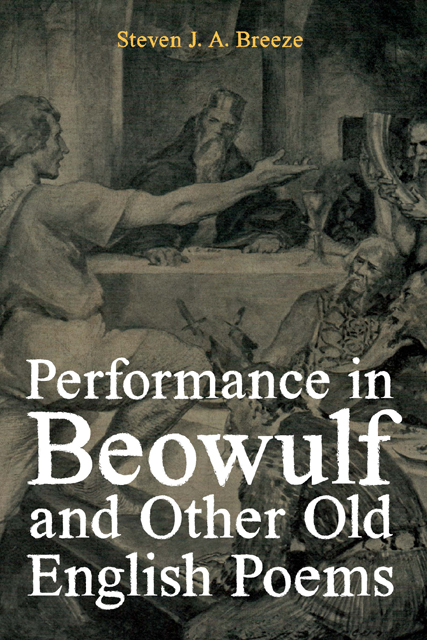Book contents
- Frontmatter
- Dedication
- Contents
- List of Illustrations and Tables
- Acknowledgements
- List of Abbreviations
- Poem Titles, Orthography, Editions, and Translations
- Introduction: Realising the Intangible
- 1 Instruments of the Poet: Exploiting the Old English Lexis
- 2 Multiformity and the Orality of Associative, Architectonic Poetics
- 3 Providence and Pleasure: Performance as Symbol
- 4 Storytelling in Beowulf and Meta-storytelling in Andreas
- 5 Wisdom and Power: Philosophies of Performance
- 6 Theme Songs: An English Tradition of Performance?
- 7 The Lure of the Lyre: Interpretation, Reenactment, and the Corpus
- Conclusion: ‘Poetic Performance’
- Bibliography
- Index
- Anglo-Saxon Studies
Conclusion: ‘Poetic Performance’
Published online by Cambridge University Press: 20 December 2022
- Frontmatter
- Dedication
- Contents
- List of Illustrations and Tables
- Acknowledgements
- List of Abbreviations
- Poem Titles, Orthography, Editions, and Translations
- Introduction: Realising the Intangible
- 1 Instruments of the Poet: Exploiting the Old English Lexis
- 2 Multiformity and the Orality of Associative, Architectonic Poetics
- 3 Providence and Pleasure: Performance as Symbol
- 4 Storytelling in Beowulf and Meta-storytelling in Andreas
- 5 Wisdom and Power: Philosophies of Performance
- 6 Theme Songs: An English Tradition of Performance?
- 7 The Lure of the Lyre: Interpretation, Reenactment, and the Corpus
- Conclusion: ‘Poetic Performance’
- Bibliography
- Index
- Anglo-Saxon Studies
Summary
In Old English poems, performance has overwhelmingly positive associations. In narrative and wisdom poems, as well as in poems such as Widsith and Deor in which a performer is the subject, performance is valuable, and performers are explicitly and routinely moral. Moreover, a belonging that binds performers such as those described as scopas and gleomen with the people is often stressed. Performance and its performers are seen as intrinsic to a harmonious and prosperous society. As well as being a positive phenomenon, the representation of performance in narrative poetry, particularly by characters defined using specific identifiers associated with performance, is often archetypal, and effectively, successfully performed. The effectiveness of a performer is shown to be the result of the knowledge and ability that they possess, sometimes – particularly in the wisdom poems – attributed to God, and at other times the product of worldly experience, as in Beowulf and Widsith. The choice of attribution to divine influence or experience appears to depend on the religious milieu surrounding a poem’s origin, as well as its subject matter. Performers in the corpus are also imbued with an authority to perform. Such ability and authority is incorporated into the gnomic sayings found in catalogue wisdom poems of the period. Narrative poems reflect the concerns of those wisdom poems, and are embellishments of the concise statements within them. The generic representation of performance is non-nuanced, and based on linguistic relationships between joy and entertainment, which accentuates the conventionality. In short, performance is routinely idealised. In Beowulf and Andreas, however, performance also performs an important structural role, through creative application by the poet. Effective performers have knowledge of stories from and about the past, which they can deliver. This enables the poet to introduce contextual material and develop a poetic world of interperformativity.
The types of poems in which performers and their performances appear lead to the conclusion that they are often imagined as an aspect of a heroic ‘Germanic’ past for Old English poets, or at least for the scribes of the late tenth and early eleventh centuries whose manuscripts have survived. This is particularly the case for the Widsith, Deor, and Beowulf poets, and this historical focus further explains the generality, idealisation, and lack of detail in these poems. The poets’ concern with the past means that performance becomes an element in that historical orientation.
- Type
- Chapter
- Information
- Performance in Beowulf; and other Old English Poems , pp. 230 - 236Publisher: Boydell & BrewerPrint publication year: 2022

